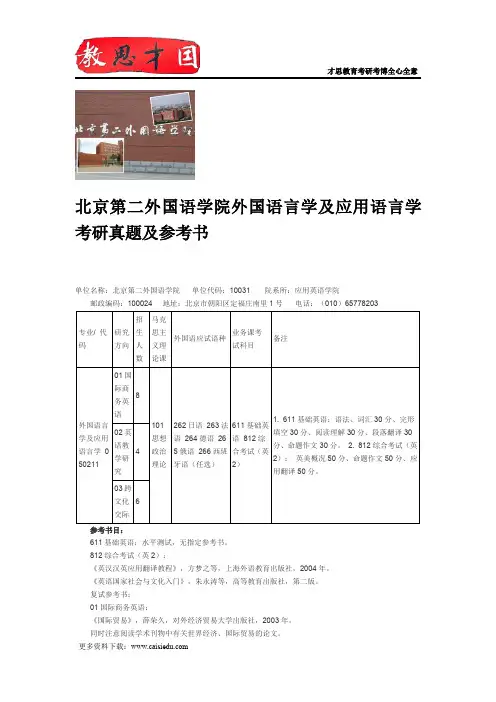北京外国语大学硕士研究生入学考试历年真题系列-2007年二外西班牙语试题
- 格式:pdf
- 大小:854.28 KB
- 文档页数:8
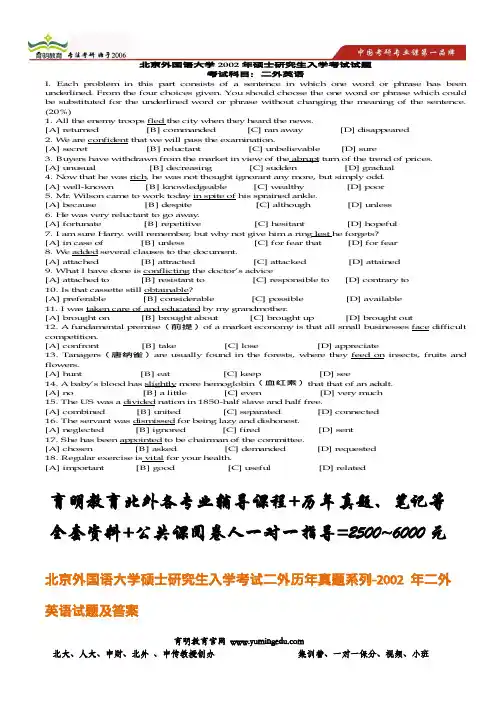
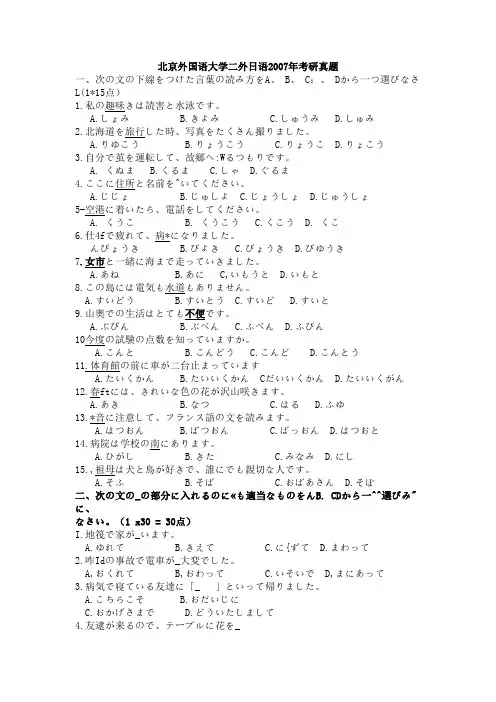
北京外国语大学二外日语2007年考研真题一、次の文の下線をつけた言葉の読み方をA、 B、 C:、 Dから一つ選びなさL(1*15点)1.私の趣味きは読害と水泳です。
A.しょみB.きよみC.しゅうみD.しゅみ2.北海道を旅行した時、写真をたくさん撮りました。
A.りゆこうB.りょうこうC.りょうこD.りょこう3.自分で茧を運転して、故鄉へ:Wるつもりです。
A. くぬまB.くるまC.しゃD.ぐるま4.ここに住所と名前を^いてください。
A.じじょB.じゅしよC.じょうしょD.じゅうしょ5-空港に着いたら、電話をしてください。
A. くうこB. くうこうC.くこうD. くこ6.仕4fで疲れて、病*になりました。
んびょうき B.びよき C.びょうき D.びゆうき7.女市と一緒に海まで走っていきました。
A.あねB.あに C,いもうと D.いもと8.この島には電気も水道もありません。
A.すいどうB.すいとうC.すいどD.すいと9.山奧での生活はとても不便です。
A.ぶびんB.ぶべんC.ふべんD.ふびん10今度の試験の点数を知っていますか。
A.こんとB.こんどうC.こんどD.こんとう11.体育館の前に車が二台止まっていますA.たいくかんB.たいいくかん Cだいいくかん D.たいいくがん12.春ftには、きれいな色の花が沢山咲きます。
A.あきB.なつC.はるD.ふゆ13.*音に注意して、フランス語の文を読みます。
A.はつおんB.ばつおんC.ぱっおんD.はつおと14.病院は学校の南にあります。
A.ひがしB.きたC.みなみD.にし15.,祖母は犬と鳥が好きで、誰にでも親切な人です。
A.そふB.そばC.おばあさんD.そぼ二、次の文の_の部分に入れるのに«も適当なものをんB. CDから一^^選びみ"に、なさい。
(1 x30 = 30点)I.地筏で家が_います。
A.ゆれてB.きえてC.に{ずてD.まわって2.咋Idの事故で電車が_大変でした。
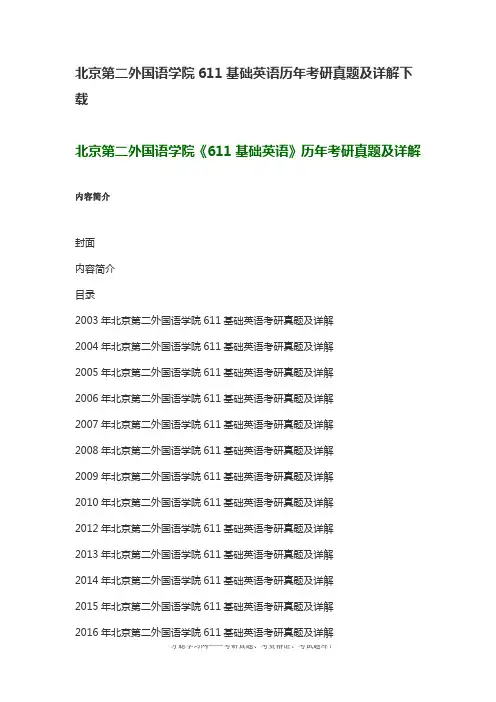
北京第二外国语学院611基础英语历年考研真题及详解下载北京第二外国语学院《611基础英语》历年考研真题及详解内容简介封面内容简介目录2003年北京第二外国语学院611基础英语考研真题及详解2004年北京第二外国语学院611基础英语考研真题及详解2005年北京第二外国语学院611基础英语考研真题及详解2006年北京第二外国语学院611基础英语考研真题及详解2007年北京第二外国语学院611基础英语考研真题及详解2008年北京第二外国语学院611基础英语考研真题及详解2009年北京第二外国语学院611基础英语考研真题及详解2010年北京第二外国语学院611基础英语考研真题及详解2012年北京第二外国语学院611基础英语考研真题及详解2013年北京第二外国语学院611基础英语考研真题及详解2014年北京第二外国语学院611基础英语考研真题及详解2015年北京第二外国语学院611基础英语考研真题及详解2016年北京第二外国语学院611基础英语考研真题及详解2017年北京第二外国语学院611基础英语考研真题及详解本资料收集了北京第二外国语学院“基础英语”2003~2017年(2011年除外)的考研真题,且所有真题均提供详细的参考答案及解析。
说明:本书精心搜集了市面上的历年真题,并整理了答案详解,备考价值尤为珍贵!若需要纸质内容,可以申请定制,详情咨询在线客服!•试看部分内容2003年北京第二外国语学院611基础英语考研真题及详解Ⅰ. GRAMMAR (20 points, 1 point each)Di re c ti o n s: In t h i s se cti o n, th e re a re20se n te n ce s e ach wi th o ne wo rd o r ph rase mi ssi n g. Ch oo se one o f the four choice s marke d A, B, C, and D th at be st comple te s th e se n te n ce. Th e n m ark th e co rre spo n di ng l e tte ron the ANSWER SHEET by blackening it.1. Th e re are m an y val u abl e se rvi ce s wh i ch th e p u b l i c are willing to p ay for, bu t which _____ bring a retu rn in money to the community.A. does noB. did notC. could notD. do not【答案】D查看答案【解析】句意:有很多公众可以出钱的有价值的服务,但是哪些会为社会回馈利益呢?很多中并不一定只有一个服务项目可赚钱回馈,所以应该用复数。
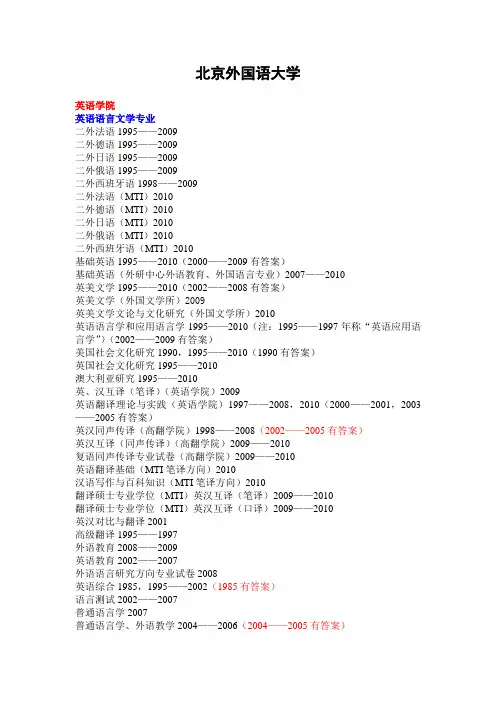
北京外国语大学英语学院英语语言文学专业二外法语1995——2009二外德语1995——2009二外日语1995——2009二外俄语1995——2009二外西班牙语1998——2009二外法语(MTI)2010二外德语(MTI)2010二外日语(MTI)2010二外俄语(MTI)2010二外西班牙语(MTI)2010基础英语1995——2010(2000——2009有答案)基础英语(外研中心外语教育、外国语言专业)2007——2010英美文学1995——2010(2002——2008有答案)英美文学(外国文学所)2009英美文学文论与文化研究(外国文学所)2010英语语言学和应用语言学1995——2010(注:1995——1997年称“英语应用语言学”)(2002——2009有答案)美国社会文化研究1990,1995——2010(1990有答案)英国社会文化研究1995——2010澳大利亚研究1995——2010英、汉互译(笔译)(英语学院)2009英语翻译理论与实践(英语学院)1997——2008,2010(2000——2001,2003——2005有答案)英汉同声传译(高翻学院)1998——2008(2002——2005有答案)英汉互译(同声传译)(高翻学院)2009——2010复语同声传译专业试卷(高翻学院)2009——2010英语翻译基础(MTI笔译方向)2010汉语写作与百科知识(MTI笔译方向)2010翻译硕士专业学位(MTI)英汉互译(笔译)2009——2010翻译硕士专业学位(MTI)英汉互译(口译)2009——2010英汉对比与翻译2001高级翻译1995——1997外语教育2008——2009英语教育2002——2007外语语言研究方向专业试卷2008英语综合1985,1995——2002(1985有答案)语言测试2002——2007普通语言学2007普通语言学、外语教学2004——2006(2004——2005有答案)普通语言学及应用语言学(外研中心)2010句法、第二语言习得2003综合考试(含国际政治、汉语)2000——2002英语新闻业务与新闻学基础知识2006——2009国际新闻2010国际法学专业(无此试卷)外交学专业综合考试(含国际政治、汉语)2000——2002中国外语教育研究中心外国语语言学及应用语言学专业二外法语1995——2009二外德语1995——2009二外日语1995——2009二外俄语1995——2009二外西班牙语1998——2009二外法语(MTI)2010二外德语(MTI)2010二外日语(MTI)2010二外俄语(MTI)2010二外西班牙语(MTI)2010基础英语1995——2010(2000——2009有答案)基础英语(外研中心外语教育、外国语言专业)2007——2010英美文学1995——2010(2002——2008有答案)英美文学(外国文学所)2009英美文学文论与文化研究(外国文学所)2010英语语言学和应用语言学1995——2010(注:1995——1997年称“英语应用语言学”)(2002——2009有答案)美国社会文化研究1990,1995——2010(1990有答案)英国社会文化研究1995——2010澳大利亚研究1995——2010英、汉互译(笔译)(英语学院)2009英语翻译理论与实践(英语学院)1997——2008,2010(2000——2001,2003——2005有答案)英汉同声传译(高翻学院)1998——2008(2002——2005有答案)英汉互译(同声传译)(高翻学院)2009——2010复语同声传译专业试卷(高翻学院)2009——2010英语翻译基础(MTI笔译方向)2010汉语写作与百科知识(MTI笔译方向)2010翻译硕士专业学位(MTI)英汉互译(笔译)2009——2010翻译硕士专业学位(MTI)英汉互译(口译)2009——2010英汉对比与翻译2001高级翻译1995——1997外语教育2008——2009英语教育2002——2007外语语言研究方向专业试卷2008英语综合1985,1995——2002(1985有答案)文化语言学2007语言测试2002——2007普通语言学2007普通语言学、外语教学2004——2006(2004——2005有答案)普通语言学及应用语言学(外研中心)2010句法、第二语言习得2003综合考试(含国际政治、汉语)2000——2002外国文学所英语语言文学专业二外法语1995——2009二外德语1995——2009二外日语1995——2009二外俄语1995——2009二外西班牙语1998——2009二外法语(MTI)2010二外德语(MTI)2010二外日语(MTI)2010二外俄语(MTI)2010二外西班牙语(MTI)2010基础英语1995——2010(2000——2009有答案)基础英语(外研中心外语教育、外国语言专业)2007——2010英美文学1995——2010(2002——2008有答案)英美文学(外国文学所)2009英美文学文论与文化研究(外国文学所)2010英语语言学和应用语言学1995——2010(注:1995——1997年称“英语应用语言学”)(2002——2009有答案)美国社会文化研究1990,1995——2010(1990有答案)英国社会文化研究1995——2010澳大利亚研究1995——2010英、汉互译(笔译)(英语学院)2009英语翻译理论与实践(英语学院)1997——2008,2010(2000——2001,2003——2005有答案)英汉同声传译(高翻学院)1998——2008(2002——2005有答案)英汉互译(同声传译)(高翻学院)2009——2010复语同声传译专业试卷(高翻学院)2009——2010英语翻译基础(MTI笔译方向)2010汉语写作与百科知识(MTI笔译方向)2010翻译硕士专业学位(MTI)英汉互译(笔译)2009——2010翻译硕士专业学位(MTI)英汉互译(口译)2009——2010英汉对比与翻译2001高级翻译1995——1997外语教育2008——2009英语教育2002——2007外语语言研究方向专业试卷2008英语综合1985,1995——2002(1985有答案)语言测试2002——2007普通语言学2007普通语言学、外语教学2004——2006(2004——2005有答案)普通语言学及应用语言学(外研中心)2010句法、第二语言习得2003综合考试(含国际政治、汉语)2000——2002德语语言文学专业二外英语1997——2003(2000——2003有答案)德国外交经济2000——2005德国文学2001——2005德语翻译理论与实践2000——2005基础德语2000——2005德语教学法2004——2005德语跨文化经济交际2000——2005德语语言学2000——2005国际问题研究所外交学专业综合考试(含国际政治、汉语)2000——2002社会科学部外交学专业综合考试(含国际政治、汉语)2000——2002国际商学院外交学专业综合考试(含国际政治、汉语)2000——2002俄语学院俄语语言文学专业二外英语1997——2003(2000——2003有答案)俄罗斯社会与文化2002——2003,2005俄罗斯文学2002——2005俄语翻译2004俄语翻译技巧2002翻译理论(俄语专业)2003俄语翻译理论与实践2005俄语基础2004——2005俄语语言学基础理论2002——2004现代俄语语言学2005俄语综合2002法语系法语语言文学专业二外英语1997——2003(2000——2003有答案)欧洲语言学专业二外英语1997——2003(2000——2003有答案)德语系德语语言文学专业二外英语1997——2003(2000——2003有答案)德国外交经济2000——2005德国文学2001——2005德语翻译理论与实践2000——2005基础德语2000——2005德语教学法2004——2005德语跨文化经济交际2000——2005德语语言学2000——2005日语系日语语言文学专业二外英语1997——2003(2000——2003有答案)日本社会文化2004(日语系)日本语言文学2004(日语系)以下试卷为日研中心试卷,仅供参考:专业日语2009(2009有答案)基础日语1997——2006,2008——2009(2000——2006,2008——2009有答案)日本概况2003——2005(2003——2005有答案)日本社会1997——2004(2000——2004有答案)日本社会经济2008(2008有答案)日本社会日本经济2005——2006(2005——2006有答案)日本文化1997——2004,2008(2000——2004,2008有答案)日本文学1997——2004,2008(2000——2004,2008有答案)日本文学日本文化2005——2006(2005——2006有答案)日本语言1997——2004(2000——2004有答案)日本语教育2008(2008答案)日本语言日本教育2005——2006(2005——2006有答案)日本语学2008(2008有答案)综合考试(日语专业)1997——2002(2000——2002有答案)日研中心日语语言文学专业二外英语1997——2003(2000——2003有答案)专业日语2009(2009有答案)基础日语1997——2006,2008——2009(2000——2006,2008——2009有答案)日本概况2003——2005(2003——2005有答案)日本社会1997——2004(2000——2004有答案)日本社会经济2008(2008有答案)日本社会日本经济2005——2006(2005——2006有答案)日本文化1997——2004,2008(2000——2004,2008有答案)日本文学1997——2004,2008(2000——2004,2008有答案)日本文学日本文化2005——2006(2005——2006有答案)日本语言1997——2004(2000——2004有答案)日本语教育2008(2008答案)日本语言日本教育2005——2006(2005——2006有答案)日本语学2008(2008有答案)综合考试(日语专业)1997——2002(2000——2002有答案)西葡系西班牙语语言文学专业二外英语1997——2003(2000——2003有答案)西班牙语基础2003——2004(其中2004年的试卷共12页,缺P11-12)西班牙语专业2003——2004欧洲语言学专业二外英语1997——2003(2000——2003有答案)阿语系阿拉伯语语言文学专业二外英语1997——2003(2000——2003有答案)欧洲语系欧洲语言文学专业二外英语1997——2003(2000——2003有答案)亚非语系亚非语言文学专业(无此试卷)国际交流学院语言学及应用语言学专业比较文学概论2004海外汉学2003——2004现代汉语1999古代汉语1999综合考试(含国际政治、汉语)2000——2002综合考试(含古代汉语、古代文学、现当代文学)2001中国历史文化2001历史文化综合1999——2000语言学与应用语言学专业综合2000语言学及现代汉语2000——2001比较文学与世界文学专业比较文学概论2004海外汉学2003——2004中国古代文学专业综合考试(含古代汉语、古代文学、现当代文学)2001高翻学院外国语语言学及应用语言学专业二外法语1995——2009二外德语1995——2009二外日语1995——2009二外俄语1995——2009二外西班牙语1998——2009二外法语(MTI)2010二外德语(MTI)2010二外日语(MTI)2010二外俄语(MTI)2010二外西班牙语(MTI)2010基础英语1995——2010(2000——2009有答案)基础英语(外研中心外语教育、外国语言专业)2007——2010英汉互译(同声传译)(高翻学院)2009——2010英汉同声传译(高翻学院)1998——2008(2002——2005有答案)英、汉互译(笔译)(英语学院)2009英语翻译理论与实践(英语学院)1997——2008,2010(2000——2001,2003——2005有答案)复语同声传译专业试卷(高翻学院)2009——2010英语翻译基础(MTI笔译方向)2010汉语写作与百科知识(MTI笔译方向)2010翻译硕士专业学位(MTI)英汉互译(笔译)2009——2010翻译硕士专业学位(MTI)英汉互译(口译)2009——2010英汉对比与翻译2001高级翻译1995——1997外语教育2008——2009英语教育2002——2007外语语言研究方向专业试卷2008英语综合1985,1995——2002(1985有答案)语言测试2002——2007普通语言学2007普通语言学、外语教学2004——2006(2004——2005有答案)普通语言学及应用语言学(外研中心)2010句法、第二语言习得2003综合考试(含国际政治、汉语)2000——2002英语语言学和应用语言学1995——2010(注:1995——1997年称“英语应用语言学”)(2002——2009有答案)。
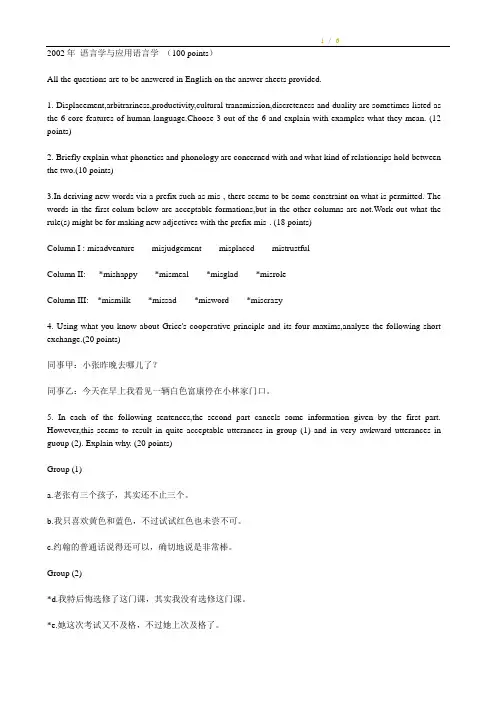
2002年语言学与应用语言学(100 points)All the questions are to be answered in English on the answer sheets provided.1. Displacement,arbitrariness,productivity,cultural transmission,discreteness and duality are sometimes listed as the 6 core features of human language.Choose 3 out of the 6 and explain with examples what they mean. (12 points)2. Briefly explain what phonetics and phonology are concerned with and what kind of relationsips hold between the two.(10 points)3.In deriving new words via a prefix such as mis-, there seems to be some constraint on what is permitted. The words in the first colum below are acceptable formations,but in the other columns are not.Work out what the rule(s) might be for making new adjectives with the prefix mis-. (18 points)Column I : misadventure misjudgement misplaced mistrustfulColumn II: *mishappy *mismeal *misglad *misroleColumn III: *mismilk *missad *misword *miscrazy4. Using what you know about Grice's cooperative principle and its four maxims,analyze the following short exchange.(20 points)同事甲:小张昨晚去哪儿了?同事乙:今天在早上我看见一辆白色富康停在小林家门口。
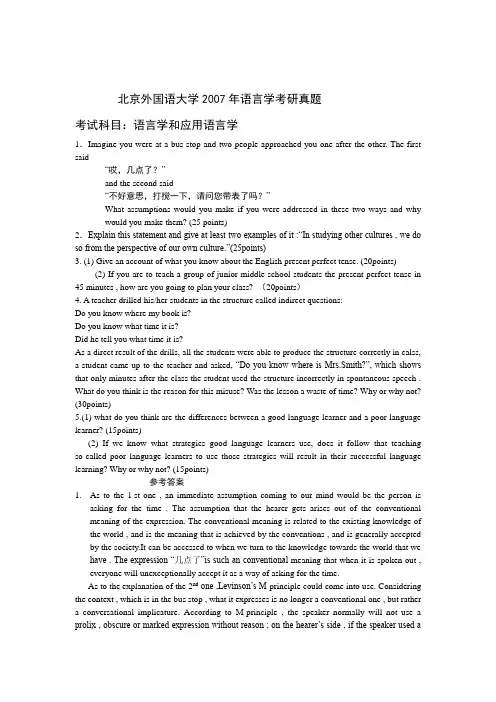
北京外国语大学2007年语言学考研真题考试科目:语言学和应用语言学1.Imagine you were at a bus stop and two people approached you one after the other. The first said“哎,几点了?”and the second said“不好意思,打搅一下,请问您带表了吗?”What assumptions would you make if you were addressed in these two ways and why would you make them? (25 points)2.Explain this statement and give at least two examples of it :“In studying other cultures , we do so from the perspective of our own culture.”(25points)3. (1) Give an account of what you know about the English present perfect tense. (20points)(2) If you are to teach a group of junior middle school students the present perfect tense in 45 minutes , how are you going to plan your class? (20points)4. A teacher drilled his/her students in the structure called indirect questions:Do you know where my book is?Do you know what time it is?Did he tell you what time it is?As a direct result of the drills, all the students were able to produce the structure correctly in calss, a student came up to the teacher and asked, “Do you know where is Mrs.Smith?”, which shows that only minutes after the class the student used the structure incorrectly in spontaneous speech . What do you think is the reason for this misuse? Was the lesson a waste of time? Why or why not? (30points)5.(1) what do you think are the differences between a good language learner and a poor language learner? (15points)(2) If we know what strategies good language learners use, does it follow that teaching so-called poor language learners to use those strategies will result in their successful language learning? Why or why not? (15points)参考答案1.As to the 1st one , an immediate assumption coming to our mind would be the person isasking for the time . The assumption that the hearer gets arises out of the conventional meaning of the expression. The conventional meaning is related to the existing knowledge of the world , and is the meaning that is achieved by the conventions , and is generally accepted by the society.It can be accessed to when we turn to the knowledge towards the world that we have . The expression “几点了”is such an conventional meaning that when it is spoken out , everyone will unexceptionally accept it as a way of asking for the time.As to the explanation of the 2nd one ,Levinson’s M-principle could come into use. Considering the context , which is in the bus stop , what it expresses is no longer a conventional one , but rather a conversational implicature. According to M-principle , the speaker normally will not use a prolix , obscure or marked expression without reason ; on the hearer’s side , if the speaker used aprolix or marked expression , he did not mean the same as he would have had when he used the unmarked expression. That is to say , in the normal situation , in the bus stop as the example above has shown , the intention of that the speaker asks others whether they wear the watch or not is not merely to care about the recipient has a watch or not , but has some other reason , because it would be bizarre to ask a stranger in the bus stop about such a personal staff. Therefore ,the hearer has to assume that the expression is related to the situation , and this expression is not what it literally mean. Following this , the hearer reaches a connection between the bus stop and the watch , that is the time. As s consequence , he knows what the speaker intends is the inquiring of the time.2. Culture is a semiotic meaning system in which symbols function to communicate meaning from one mind to another. It is related to language in such a way that language is a part of culture and a part of human behavior , and also the primary medium for transmitting much of culture. Therefore , without language , culture would not be possible . Consequently , when studying a culture , we often rely on the language . Therefore , we may use our own language to describe the target culture , which may be the one interpretation of the statement “In studying other cultures , we do so from the perspective of our own culture .”What’s more , when studying other cultures , we will definitely come across the differences between the target culture and our own culture. We will subconsciously compare the two different cultures . Seeing from the perspective of our own culture ,we find how the target culture is different from our own culture, and this makes the target culture more distinctive from our own .3. (1) The English present perfect tense is to express the idea that although an action or state happened (or started to happen ) in the past , it has some connection with the present . It may be that the ( present ) result of the action is more important than the action itself . Alternatively , we may be inferring that the action is important , but the time when it occurred is not .(2) I may probably choose the top-down approach to lead the students to the recognition of this tense .First , I will list out a group of sentences that are all in the present perfect tense , and make the students generalize the general feature in the form of those sentences , and figure out the basic construction of the present perfect tense , that is “have + V-en ”.Second , to make the students clear about the conditions in which the present perfect tense can use , I would turn to pictures to explain the sentences listed out in the 1st step ; therefore , the students can find out the use of this tense in a more visual way .Third , considering the possibility that the students may mix up the present perfect tense with the past tense , I would help students figure out their differences . In this step , pairs of sentences with present perfect tense and past simple tense respectively would be listed out , and accompanying them would be the time axis , which could distinguish the different referring of the two different tenses . The students would found out the differences themselves with the help of the time axis .Forth , I would create a situation for the students to practice : two friends who haven’t seen each other for a long time and just met each other . I would encourage the students to make up a dialogue based on such a situation , trying to use the present perfect tense in the places where they think it is appropriate to use it . After students show their dialogue to the class , the class would be asked to decide whether the use of that tense is appropriate according to what they expressed .4. The misuse shows a separation of the abstract grammatical rules from the everyday use of language . The core of the teaching method above could be said as the habit formation throughrepetition . This method seems to concerns only the formation and performance of habits but not problem-solving . As a result , the students may only know the form ,but not know when and where this form is used , which is essential to the actual use of language . This type of teaching reveals the defect of the traditional grammar teaching , that is,it concentrates only on the grammatical forms and the meaning of individual words , whereas the meaning of the whole sentence is thought to be self-evident . Therefore , in conscious training , students may be able to use a grammatical structure correctly , while in the spontaneous and subconscious speech , they may fail to still take the structure into consideration . In other words ,they may not know how to use that specific form or expression in a daily communication .The fact that this teaching method is not perfect does not mean that there is no need to teach the grammar . Therefore , it would be inappropriate to label such a lesson as a waste of time . It is true that the students should be taught how to produce appropriate utterances given a communicative situation ; yet , they have to know the correct form first , which is greatly related to grammar . It is generally agreed grammar has its due value in language learning .What’s more , there can be some improvements to this lesson . It would be appreciated to add the communicative oriented tasks in it , which will make the students understand more clearly the situations the pattern is supposed to used in , and also help the students apply them to the spontaneous communication .5. (1) The difference between the good language learners and the poor language learners significantly lies in the difference of learning strategies.The good language learners are able to use their strategies effectively . They could actively involve themselves in the language learning process by identifying and seeking preferred learning environments and exploring them . They could also develop an awareness of language as a system , and as a means of communication and interaction . What’s more , they could realize initially or with time that they must cope with the affective demands made upon them by language learning and succeed in doing so , and then monitor the performance in the target language . Whereas , the poor language learners are often unable to use the strategies appropriately .(2) It would be wrong to assume that the strategies good language learners use will result in success for the poor language learners if they follow those strategies , because language learning has individual differences . For example , everyone has his own learning style . There are generally three types of learning style , namely , visual , auditory , and tactile . We could assume that the good language learner is a more visual learner , which means he learns faster and better from visual displays including : diagrams , illustrated text books , overhead transparencies , videos , flipcharts and handouts . However , the contrasting poor learner is of every possibility more an auditory learner than a visual one , which means they can learn their best through verbal lectures , discussions , talking things through and listening to what others have to say , and written information may have little meaning until it is heard . Therefore , the strategies the good language learner uses will be more visual than auditory , which is obviously not applicable to the poor language learner . Thus , the individual differences should be taken into consideration in following other s’ learning strategies .。
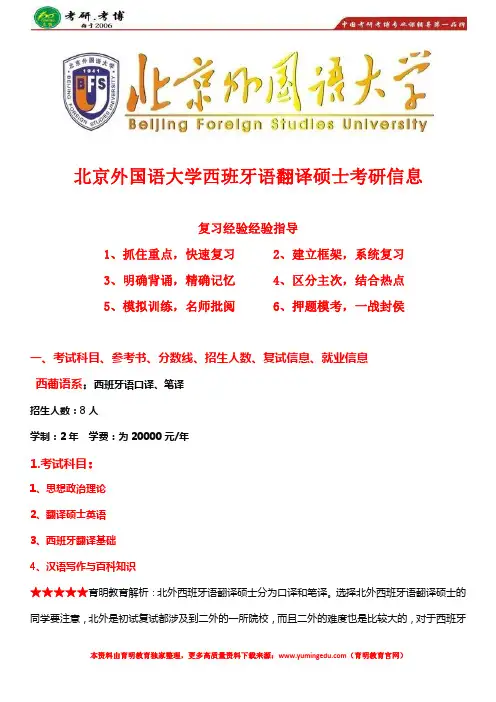
北京外国语大学西班牙语翻译硕士考研信息复习经验经验指导1、抓住重点,快速复习2、建立框架,系统复习3、明确背诵,精确记忆4、区分主次,结合热点5、模拟训练,名师批阅6、押题模考,一战封侯一、考试科目、参考书、分数线、招生人数、复试信息、就业信息西葡语系:西班牙语口译、笔译招生人数:8人学制:2年学费:为20000元/年1.考试科目:1、思想政治理论2、翻译硕士英语3、西班牙翻译基础4、汉语写作与百科知识★★★★★育明教育解析:北外西班牙语翻译硕士分为口译和笔译。
选择北外西班牙语翻译硕士的同学要注意,北外是初试复试都涉及到二外的一所院校,而且二外的难度也是比较大的,对于西班牙语二外的选择是固定的,就是对于英语的考查,这点提醒大家在备考西班牙语的同时不能忽视对于英语的练习,平时要多注意英语知识、英语词汇的积累、多关注一些新闻时事等。
2.分数线:2016年思想政治理论、翻译硕士英语单科分数是53分两门专业课(西班牙语翻译基础、汉语写作与百科知识)240分总分350分2015年思想政治理论、翻译硕士英语单科分数是52分两门专业课(西班牙语翻译基础、汉语写作与百科知识)243分总分345分★★★★育明教育宋老师解析:北外从2015年开设了西班牙语MTI,口译和笔译两个方向,单科(满分=100)及总分的分数要求与国家线(A类考生)的要求相同的,另外对两门专业课单独划线,15年和16年西班牙语MTI两门专业的划线都在240分以上,预计在2017年也会在240—250之间,大家要在总分过线的基础上在专业课部分好好下功夫,公共课能拉开的距离的地方很小,主要还是要看专业课部分.也是我们同学之间拉开距离的地方。
3.参考书:翻译硕士英语:《新编大学英语》(1-5册),浙江大学编著,外语教学与研究出版社《新编大学英语语法》黄建滨,邵永真,外语教学与研究出版社★西班牙语翻译基础1、董燕生、刘建:《现代西班牙语》第一册,第二册,外语教学与研究出版社,1999年。
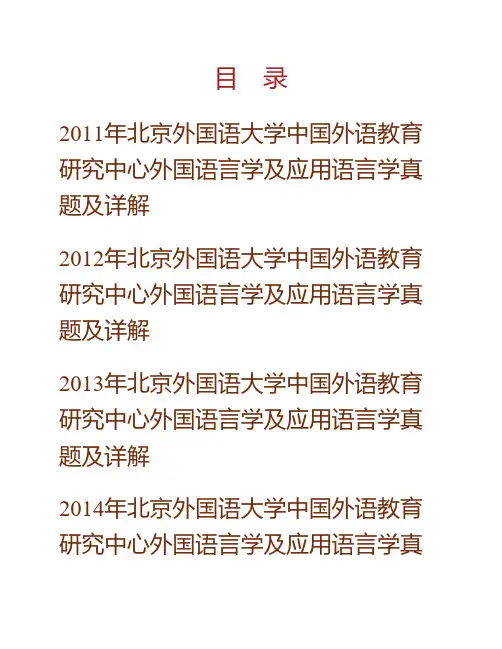
目 录2011年北京外国语大学中国外语教育研究中心外国语言学及应用语言学真题及详解2012年北京外国语大学中国外语教育研究中心外国语言学及应用语言学真题及详解2013年北京外国语大学中国外语教育研究中心外国语言学及应用语言学真题及详解2014年北京外国语大学中国外语教育研究中心外国语言学及应用语言学真题及详解2015年北京外国语大学中国外语教育研究中心外国语言学及应用语言学真题及详解2011年北京外国语大学中国外语教育研究中心外国语言学及应用语言学真题及详解I. Briefly explain the following terms. (20 points)1.perlocutionary act【答案】According to Austin, a speaker might be performing three acts simultaneously when speaking: locutionary act illocutionary act perlocutionary act. A perlocutionary act is the effect of the utterance. Thus, by saying “Morning!” the speaker has made it clear that he wants to keep friendly relations with the hearer.2.minimal pair【答案】Minimal pairs are the two words which are identical in every way except for one sound segment that occurs in the same place in the string. For example, the English words bear and pear constitute a minimal pair as they differ in meaning and in their initial phonemes /b/ and /p/.3.distinctive feature【答案】The distinctive feature refers to a property which distinguishes one phoneme from another. For example, “voicing” is a distinctive feature, since it plays an important role in distinguishing obstruents in English.4.linguistic variable【答案】Linguistic variable are those where the meaning remain constant but form varies like cat and pussy have the same social meaning but different form. So far pronunciation is concerned house [h] and with [h] has same social meaning with different pronunciation. Here variables are just the tools to analyze the language to set social dimensional society.5.lingua franca【答案】It is a language that is used for communication between different groups of people, each speaking a different language. The lingua franca couldbe an internationally used language of communication (e. g. English), it could be the native language of one of the groups, or it could be a language which is not spoken natively by any of the groups but has a simplified sentence structure and vocabulary and is often a mixture of two or more languages.II. Answer the following questions. (30 points)1.Why do we say linguistics is a science? (10 points)【答案】Linguistics is generally defined as the scientific study of language. It tries to answer the basic questions “What is language?” and “How does language work?” Linguistics studies not any particular language, e.g. English, Chinese, Arabic, and Latin, but it studies languages in general.It is a scientific study because it is based on the systematic investigation of linguistic data, conducted with reference to some general theory of language structure. In order to discover the nature and rules of the underlying language system, what the linguist has to do first is to collect and observe language facts, which arc found to display some similarities, and generalizations are made about them; then he formulates some hypotheses about the language structure. But the hypotheses thus formed have to be checked repeatedly against the observed facts to fully prove their validity. In linguistics, as in any other discipline, data and theory stand in a dialectical complementation; that is, a theory without the support of data can hardly claim validity, and data without being explained by some theory remain a muddled mass of things.(此题考查语言学作为一门学科其科学性,此题开放性试题,从其研究内容及方法角度作答即可。
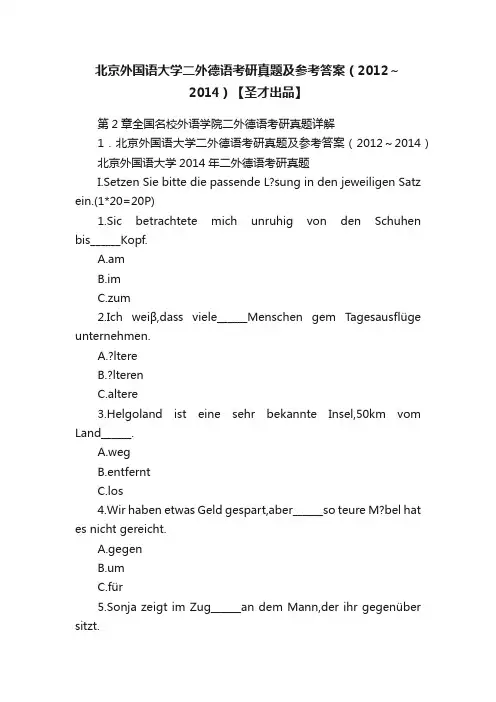
北京外国语大学二外德语考研真题及参考答案(2012~2014)【圣才出品】第2章全国名校外语学院二外德语考研真题详解1.北京外国语大学二外德语考研真题及参考答案(2012~2014)北京外国语大学2014年二外德语考研真题I.Setzen Sie bitte die passende L?sung in den jeweiligen Satz ein.(1*20=20P)1.Sic betrachtete mich unruhig von den Schuhen bis______Kopf.A.amB.imC.zum2.Ich weiβ,dass viele______Menschen gem Tagesausflüge unternehmen.A.?ltereB.?lterenC.altere3.Helgoland ist eine sehr bekannte Insel,50km vom Land______.A.wegB.entferntC.los4.Wir haben etwas Geld gespart,aber______so teure M?bel hat es nicht gereicht.A.gegenB.umC.für5.Sonja zeigt im Zug______an dem Mann,der ihr gegenüber sitzt.A.groβe AugenB.groβen SpaβC.groβes Interesse6.Erika hat gestern die sch?ne Tasche gekauft,______sie zu ihrem Mantel passt.A.weilB.dennC.dass7.Das Gegenteil von,,Ankunft"ist______.A.AuskunftB.AbfahrtC.Einkommen8.Einmal kam er mit sehr schlechter Laune______mir.A.beiB.nachC.zu9.Das kleine M?dchen fürchtete sich______der Dunkelheit.A.fiberC.bei10.Er ist sehr lebhaft und h?rt nicht immer auf das,______seine Eltern sagen.A.wennB.wasC.dass11.Sie kommt dauernd zu sp?t.Das kann______doch nicht immer gefallen lassen!A.manB.einemC.einen12.Viele Menschen sind zu ganz erstaunlichenLeistungen______.A.f?higB.starkC.fertig13.Den Flugzeugabsturz hat nur______überlebt.A.einB.eineC.einer/doc/1211674053.html,puter______heu te in fast allen Lebensbereichen Verwendung.A.hattenB.findenC.nehmen15.Peter hat sich nicht gemeldet.Er wird das Problem alleine______.A.gel?st habenB.gel?st werdenC.gel?st k?nnen16.______die Menschen nicht wesentlich bewuβter mit der Umwelt umgehen,wird es zufurchtbaren Katastrophen kommen.A.DamitB.WennC.Indem17.Für meine Magisterarbeit______noch eine Reihe Informationen.A.fehltB.mangeltC.braucht18.Alle Zeitungen wollen mehr Leser für______gewinnen,abervom Verkauf allein k?nnen sienoch nicht existieren.A.sichB.sieC.selbst19.Goethe erkannte______,als er schon alt war,den Wert der chinesischen Kultur.A.gleichB.nutC.erst.Es gibt nicht viel Neues,______.A.was zu berichten sich lohnen würdeB.davon zu berichten sich lohnen würdeC.das zu berichten sich lohnen würdeII.Setzen Sie bitte die passenden W?rter in den Text ein.(1P*10=10P)Computerclub für M?dchenEinmal in der Woche trifft sich die Lehrerin Susanne Weinert nachmittags21einigen Schü-lerinnen im Computerraum der Schule.Gemeinsam arbeiten sie kleine Programme aus oder entwerfen auf dem Bildschirm Zeichnungen und T exte.Frau Weinert22fiber die Fortschritte und die guten,kreativen /doc/1211674053.html,puterspiele,23sich vor allem Jungen gern besch?ftigen,sind in der Gruppe nicht sehr beliebt.Den,,Computerclub ftir M?dchen"hatte Frau Weinert24,um ihre Schülerinnen mit der neuen Technologie bekannt zu machen, lmmer wieder hatte sie im Unterricht geh?rt,dass Technik nur etwas für Jungen sei und M?dchen mit dem Computer25anfangen k?nnten.Dieses Vorurteil wollte sie abbauen.Um den M?dchenüberdie ersten Schwierigkeiten hinwegzuhelfen,26keine Jungen in den Club aufgenommen werden.Die M?dchen w?ren sonst im27gewesen.Die meisten Jungen sehen n?mlich im Computer ein attraktives technisches Spielzeug,28die M?dchen dazu neigen,auf den Computer zun?chst ablehnend zu reagieren.Das wollte Frau Weinert vermeiden.29solche Projekte wie der Computerclub für M?dchen wichtig sind,zeigen die Ergebnisse des Schtilerwettbewerbs,,Informatik"aus dem Jahre2008.An diesem Wettbewerb konnten Jugendliche aus der Bundesrepublik Deutschland teilnehmen und wertvolle Preise gewinnen.Es meldeten sich fast1500Computerfans,aber nur22von ihnen waren M?dchen. Diese erzielten aber30sehr gute Ergebnisse.21.A.mit B.zu C.auf D.an22.A.verabschiedet B.?rgert sich C.besch?ftigt sich D.freut sich23.A.an denen B.über die C.mit denen D.für die24.A.gezeigt B.unterrichtet C.verbracht D.gegründet25.A.nichts B.viel C.nicht D.etwas26.A.etwas B.sollten C.brauchten D.wurden27.A.Vorteil B.Licht C.Nachteil D.Spiel28.A.nachdem B.w?hrend C.bevor D.bis29.A.Dass B.Weil C.Indem D.Als30.A.im Wert B.im Werk C.im Durchschnitt D.im Teil III.Lesen Sie folgende Texte und l?sen Sie bitte die Aufgaben.(20P) Text AKein Geld für Irokesen(易洛魁人)Ein junger Arbeitsloser in Stuttgart bekommt vom Arbeitsamt kein Geld.Warum?Den Beamten dort gef?llt sein Aussehen nicht.Jeden Morgen geht Heinz Kuhlmann,23,mit einem Ei ins Badezimmer.Er will das Ei nicht essen,er braucht es für seine Haare.Heinz tr?igt seine Haare ganz kurz,nur in der Mitte sind sie Heinz das Ei.,,In Stuttgart habe nur ich diese Frisur",sagt Heinz.Das gef?llt ihm.Das Arbeitsamt in Stuttgart hat eine andere Meinung.Heinz bekommt kein Arbeitslosengeld und keine Stellenangebote.Ein Angestellter im Arbeitsamt hat zu ihm gesagt:,,Machen Sie sich eine normale Frisur.Dann k?nnen Sie wiederkommen.Ein anderer Angestellter meint:,,Herr Kuhlmann sabotiert(破坏)die Stellensuche."Aber Heinz Kuhlmann m?chte arbeiten.Seinfrüherer Arbeitgeber,die Firma Kodak,war seh r zufrieden mit ihm.Nur die Arbeitskollegen haben Heinz das Leben schwer gemacht.Sie haben ihn immer ge?rgert.Deshalb hat er gekündigt. Bis jetzt hat er keine neue Stelle gefunden.Die meisten Jobs sind nichts für ihn,das weiβer auch:,,Verk?ufer in einer Bu chhandlung,das geht nicht.Dafür bin ich nicht der richtige Typ.Heinz will arbeiten,aber Punk will er auch bleiben.Gegen das Arbeitsamt führt er jetzt einen Prozess. Sein Rechtsanwalt meint:,,Auch ein arbeitsloser Punk muss Geld vom Arbeitsamt bekommen." Heinz Kuhlmann lebt jetzt von ein paar Euro.Die gibt ihm sein Vater.(234W?rter)Aufgabe:Sind folgende Aussagen richtig(A)oder falsch(B)?(2P*5=10P)31.Heinz Kuhlmann ist ein Punk,zur Zeit ist er arbeitslos.32.Es tut ihm sehr Leid,dass er der einzige ist,der die lrokesenfrisur in Stuttgart hat.33.Da sein Arbeitgeber mit seiner Arbeit unzufrieden war,hat er dann gekündigt.34.Wegen seines Aussehens bekommt er schwer eineArbeitsstelle.35.Und auch das Arbeitslosengeld bekommt er nicht,daher führt er einen Proz ess gegen dasArbeitsamt.Text BLandeier in der GroβstadtDas Leben in einer groβen Stadt kann ziemlich aufregend sein.Vor allem für junge Frauen aus einer l?ndlichen Umgebung-im Volksmund(民间传说),,Landeier"genannt.,Ich wollte mein eigenes Leben haben",sagt Lee Ann.Bei den Eltern eines Freundes fand sie eine Unterkunft.Lee Ann,20Jahre,kam vor einem Jahr mit ein paar Koffern nach Berlin.,,Meine Eltem wohnen in einem kleinen Dorf bei Lübeck.Der letzte Bus f?hrt um halb sieben",sagt Lee Ann.,,Dort war nichts l os!"Sie wollte unbedingt in die Groβstadt,obwohl sie dort niemanden kannte.,,Auβer ein paar Leuten,die ich durch das Intemet kennen gelernt habe."So fand sie auch ihre erste Unterkunft.,,In der ersten Woche war es richtig schlimm",erinnert sich Lee Ann,,,da wollte ich eigentlich gleich wieder weg,nur zurück."Sie fand die Atmosph?re in der Groβstadt kalt.Einen Ausbildungsplatz fand sie erst nach langer Suche.Inzwischen hat die junge Frau eine eigene Wohnung gefunden.Mit ihr wohnt nur ihre Katze.Ihr Bild von den Groβstadtmenschen ist auch besser geworden.Die Berliner sind total freundlich,findet sie.Nur die Jungs,,,da habe ich eher schlechte Erfahrungen gemacht",sagt Lee Ann.,,Man lernt sich schnell kennen,aber wird genauso schnell wieder vergessen."(210W?rter)Aufgabe:W?hlen Sie die richtige L?sung.(2P*5=10P)36.Mit,,Landeiern"meint man im Volksmund______.A.M?dchen aus dem LandB.M?dchen in der UmgebungC.junge Frauen in der Groβstadt37.Lee wollte unbedingt nach Berlin,weil______.A.sie in Berlin einen Freund hatB.sie Probleme mit ihren Eltern hatteC.im Dorf,wo sie wohnte,nichts los warD.ihre Eltern dort eine Unterkunft haben38.______,wollte sie gleich wieder weg und zurück.A.Weil Lee viele Freunde in Berlin hatteB.Weil die Atmosph?re in der Groβstadt ganz kalt warC.Weil die erste Woche in Berlin total interessant warD.Weil Lee anfangs Heimweh hatte39.Einen Ausbildungsplatz fand Lee______.A.schon in der ersten WocheB.durch das lnternetC.sehr schnellD.mit groβer Mühe40.Jetzt gef?llt Lee das Groβs tadtleben,weilA.sie schon eine eigene Wohnung hatB.eine Katze mit ihr wohntC.die Berliner eigentlich ganz freundlich sindD.sie mit den Jungen gute Erfahrungen gemacht hatIV.德译中(30P)Die Zukunft ist die Stadt?Imrner mehr Menschen vom Land verlassen hoffnungsvoll ihre D?rfer und ziehen in die groβen Siedlungsr?ume(居民区).Befragt,was sie dort suchen,antworten all diese Menschen das Gleiche:Unsere Zukunft ist die Stadt!Im Gep?ck der Suchenden findet sich einzig Hoffnung.Hoffnung auf ein Leben,dasbesser als das zuvor gelebte ist.Raus,aus der d?rflichen Enge.Die Zukunft der Menschheit liegt in den St?dten.Aber ja,vieles gibt es in diesen St?dten,was es so sch?n,so groβnirgends sonst gibt.Müllberge(垃圾山),die so groβsind.dass man vier Stunden darauf und darin h erumwandern kann.Was l?sst sich da nicht alles finden,was das Leben so angenehm,so st?dtisch macht.Die Kaffeemaschine,die noch funktioniert,der Kühlschrank,in dem man all das,was man hat,so gut verstauen(摆放整齐)kann.Wen st?rt also dieser Reichtum,der doch so schnell erworben werden kann,dass die Luft extrem verpestet(污染)wird.250Millionen Stadtbewohner haben kein sauberes Trinkwasser,zehn Millionen,davon alleine vier Millionen Kinder,sterben j?hrlich an den Folgen von schmutzigem Trinkwasser.Irgendwann morgen werden die Menschen in diesen St?dten selbst auf den Müllkippen(垃圾堆)nichts mehr zum Essen finden.Was dann?V.中译德:(20P)1.世界有超过一半的人口生活在城市。
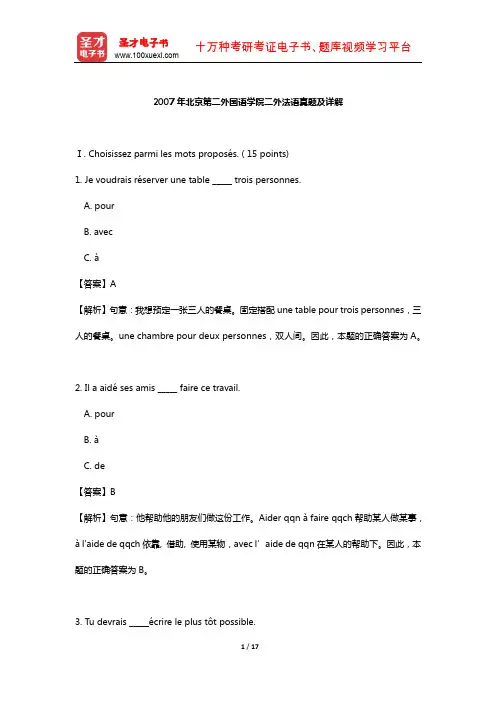
2007年北京第二外国语学院二外法语真题及详解Ⅰ. Choisissez parmi les mots proposés. ( 15 points)1. Je voudr ais réserver une table _____ trois personnes.A. pourB. avecC. à【答案】A【解析】句意:我想预定一张三人的餐桌。
固定搭配une table pour trois personnes,三人的餐桌。
une chambre pour deux personnes,双人间。
因此,本题的正确答案为A。
2. Il a aidé ses amis _____ faire ce travail.A. pourB. àC. de【答案】B【解析】句意:他帮助他的朋友们做这份工作。
Aider qqn à faire qqch帮助某人做某事,à l'aide de qqch依靠, 借助, 使用某物,avec l’aide de qqn在某人的帮助下。
因此,本题的正确答案为B。
3. Tu devrais _____écrire le plus tôt possible.A. de luiB. leC. lui【答案】C【解析】句意:你必须趁早回信给他。
Ecrire à qqn写给某人,这里的à qqn是écrire的间接宾语,因此用间接宾语人称代词lui。
因此,本题的正确答案为C。
4. Nous n’avons pas compris _____ il nous a dit.A. ce qu’B. ce quiC. ce que【答案】A【解析】句意:我们没有明白他和我们讲的是什么。
这里的ce qu’是ce que的缩写,在从句中作dire的直接宾语,dire qch à qn对某人说某事,即il a dit qqch à nous。
